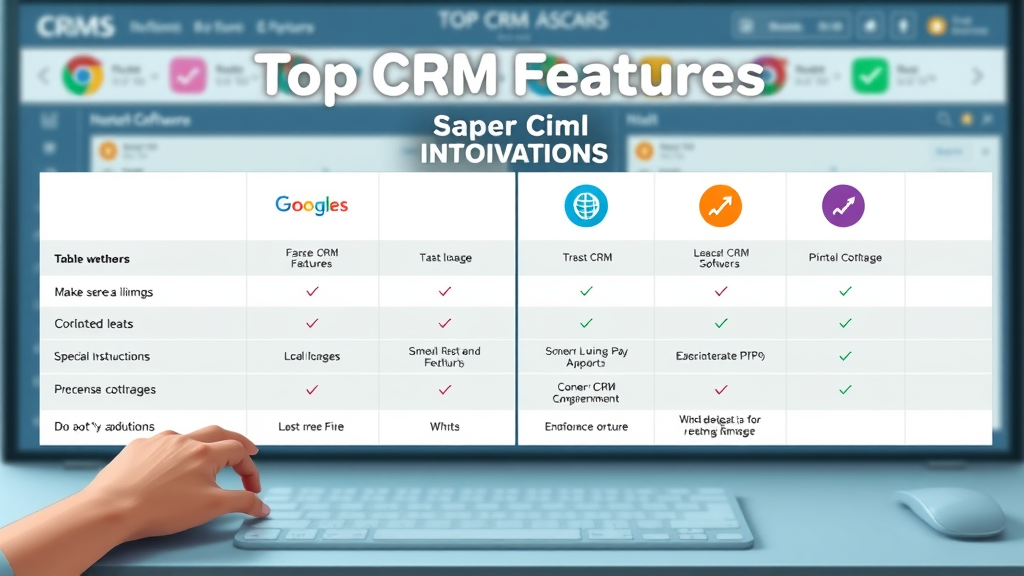Did you know that over 91% of businesses with more than 11 employees now use CRM software to streamline marketing and customer engagement? In today's digital landscape, standing out means simplifying your workflow, unifying your customer data, and launching smarter marketing campaigns. CRM integration for marketing isn’t just a trend—it’s the secret edge that lets you elevate your business and deliver experiences customers will never forget. Dive in to uncover the practical steps, proven benefits, and expert insights you need to take your marketing strategy to the next level.
Revealing the Power: Why CRM Integration for Marketing is a Game-Changer
- Did you know that over 91% of businesses with more than 11 employees now use CRM software to streamline marketing and customer engagement? Discover how crm integration for marketing can make your workflow seamless.

CRM integration for marketing has quickly become an essential part of modern business strategies, transforming how companies interact with customers and structure campaigns. By linking your CRM system to marketing automation platforms, social media, and analytics tools, you empower your marketing team to operate with greater precision, minimizing manual data entry, and reducing the chance of errors. The result is a single source of truth for all your marketing communications and customer interactions—allowing you to personalize outreach at scale.
Moreover, the growing demand for seamless connectivity between CRM platforms and various marketing tools has helped businesses eliminate data silos that used to slow down sales and marketing alignment. For example, when a customer clicks on an ad, signs up for a newsletter, or interacts with social media, all relevant data flows smoothly into an integrated CRM . This means your sales rep has complete context for every conversation, while your marketing campaigns are tailored to meet evolving customer needs. It’s time to uncover how to fully leverage these integrations and stay ahead of your competition.
Unlocking Success: Core Features and Benefits of CRM Integration for Marketing
How CRM Integration for Marketing Centralizes Customer Data and Improves Customer Experience

Centralizing customer data is a fundamental benefit of CRM integration for marketing. With all interactions—emails, phone calls, social media engagement, and purchase history—captured automatically, marketers can develop a 360-degree view of each customer. This consolidation empowers you to deliver more personalized experiences, as every communication is informed by real-time information from across your business. For example, if a prospect engages with your campaign on social media, their response is logged and visible to both marketing and sales teams.
This unified approach not only enhances the customer experience but also increases customer satisfaction. Since all departments share accurate, updated information, handoffs between marketing, sales, and customer support become seamless. Your marketing team can segment audiences with precision, automate nurturing workflows, and track every stage of the customer journey. By leveraging CRM data for targeted outreach, you exponentially boost the relevance and effectiveness of your campaigns—while building stronger, trust-based relationships with prospects and customers alike.
Enhancing Marketing Campaigns through CRM Integrations with Social Media and Marketing Automation
A robust crm integration for marketing streamlines your ability to launch, monitor, and optimize marketing campaigns across multiple channels, especially through social media and marketing automation . By connecting your CRM system with platforms like Facebook, Twitter, LinkedIn, or Instagram, you can automate the distribution of personalized content based on customer preferences and past behaviors—ensuring each touchpoint is meaningful.
This integration provides invaluable analytics, allowing you to track click-through rates, conversions, and engagement across every campaign channel. Marketers can A/B test messages, adjust strategies in real-time, and identify the channels producing the most qualified leads. Using CRM software , marketing teams not only simplify campaign execution but also automate follow-up messages, schedule posts, and nurture customers—without sacrificing a personal touch. The result? A dramatic increase in ROI and overall campaign performance, fueled by connected data and powerful automation.
Eliminating Data Silos: Achieving Sales and Marketing Alignment with CRM Integration

One of the most persistent challenges in organizations is the existence of data silos —separate storage spaces where crucial customer information is isolated within departments. CRM integration for marketing breaks down these barriers, making it possible for sales and marketing teams to collaborate more efficiently through shared access to up-to-date customer profiles and campaign performance metrics.
The alignment enabled by CRM integrations means no more duplicate data entry, lost leads, or miscommunications between departments. Instead, both teams can strategize together, drawing on comprehensive customer data to target prospects at the right time with the right message. As workflows become more streamlined, organizations experience faster lead qualification, better customer engagement, and a more cohesive overall approach to relationship management. The benefits extend to improved morale, increased efficiency, and consistent customer satisfaction.
What You'll Gain by Mastering CRM Integration for Marketing
- Strengthen customer relationships with an integrated crm system
- Automate outreach and optimize marketing campaigns
- Empower sales and marketing teams to collaborate seamlessly
- Leverage crm data and analytics for smarter business decisions
By mastering CRM integration for marketing , businesses unlock transformative potential across their departments. The centralization of customer information means every sales rep and marketer knows exactly where a customer stands in the journey, allowing for highly-targeted outreach and better service. Marketing automation capabilities make it easy to stay connected with prospects, optimizing campaigns and nurturing leads without added manual effort.
Collaboration between sales and marketing becomes smoother, as shared CRM systems dissolve departmental barriers. Access to real-time crm data and actionable analytics enables smarter decisions—whether you’re analyzing the ROI of your latest campaign or adjusting strategies for new trends. Ultimately, CRM integration helps you deliver unified customer experiences that foster loyalty, drive conversions, and fuel sustainable growth.
CRM Integration for Marketing: Navigating the Core Concepts

Understanding CRM Software, Systems, and Integration Platforms
To truly leverage crm integration for marketing , it’s vital to understand the building blocks: CRM software, CRM systems, and integration platforms . CRM software (like HubSpot, Salesforce, or Zoho CRM) provides the foundation for storing and managing customer data and automating communication. Integration platforms (such as Zapier or MuleSoft) connect your CRM to marketing tools, email platforms, social media accounts, and analytics dashboards, consolidating workflows into a singular, manageable process.
The diversity of CRM systems available allows businesses to choose the solution that best supports their unique marketing needs. From lead scoring and segmentation to campaign management and reporting, the right integration platform bridges the gap between your CRM system and every touchpoint along the customer journey. This means seamless updates, reduced manual intervention, and more opportunity to innovate with marketing automation and audience targeting.
Connecting Your CRM: Marketing Automation, Social Media, and Customer Communication
Connecting your CRM goes far beyond simply tracking contacts—it involves linking every customer interaction across multiple channels. Through CRM integration with marketing automation tools, your marketing team can create multi-step customer journeys that respond instantly to actions taken on your website or social media.
For instance, when prospects fill out a lead form on Facebook or click an email campaign, their information flows directly into your CRM system, triggering automated follow-ups and nurturing workflows. This creates a unified stream of customer communication, providing consistent, targeted messaging and building trust over multiple interactions. Integration ensures marketing teams stay responsive, proactive, and highly personalized at every stage of the funnel.
Integrated CRM for Customer Service and Customer Support: Real-World Case Studies
Real-world examples show how integrated CRM solutions can revolutionize customer service and customer support . For instance, a global retailer using integrated CRM systems synced their support team’s live chat history with customer purchase data, enabling agents to deliver faster, more accurate responses and upsell appropriate products.
Another case features a SaaS provider using CRM integration to automatically assign support tickets based on customer tier and previous interactions, ensuring VIP customers received priority attention. These examples demonstrate that integrating your CRM is not just about marketing automation but also about delivering excellent customer experiences, reducing resolution times, and increasing customer satisfaction scores.
How to Get Started with CRM Integration for Marketing
- Assess your current crm system and data sources
- Define your marketing automation and integration platform goals
- Identify vital crm integrations and align with your marketing campaign objectives
- Collaborate with sales and marketing teams to remove data silos
- Test, measure, and refine your integrated crm workflow

Starting your journey with CRM integration for marketing can feel overwhelming, but breaking it into manageable steps makes success achievable. Begin by auditing your current systems and meticulously cataloging data sources, processes, and desired touchpoints. Next, set clear, measurable goals for your marketing automation and the capabilities you need from your integration platform —whether that’s seamless lead handoffs, automated campaign tracking, or robust analytics.
Once you know what you need, identify the most impactful integrations to support your marketing campaign objectives. Involve both sales and marketing stakeholders to eliminate data silos, ensuring everyone is on board. From there, adopt an iterative approach—pilot your integrated workflows, collect performance metrics, and refine processes as needed for a streamlined, future-ready solution.
Choosing the Right CRM Software for Maximum Marketing Impact

Selecting the ideal crm software is crucial for achieving the full potential of your marketing strategy. Leading CRM platforms like Salesforce, HubSpot CRM, Zoho CRM, and Microsoft Dynamics 365 offer diverse sets of features, from robust marketing automation to seamless integration with popular social media channels and analytics dashboards.
Take advantage of free trials when available to ensure that the software intuitively fits your workflow. Prioritize tools with strong integration platform ecosystems, user-friendly interfaces, and advanced analytics. Remember, the best option empowers your marketing team to automate processes, analyze customer data, and deliver outstanding customer experiences at every touchpoint.
Ensuring Customer Satisfaction with Continuous CRM System Upgrades
Your CRM system shouldn’t remain static—continuous upgrades and improvements ensure your marketing stays competitive. Choose a solution that offers regular updates, improved security, and feature enhancements driven by real-world user feedback. Regularly review how your CRM is meeting the changing needs of your business, your marketing team, and your customers.
Consider scheduling quarterly or bi-annual training sessions for your teams to stay up-to-date with new features and best practices. These upgrades and ongoing education help you maximize the ROI of your CRM integration for marketing by driving continual improvement in customer satisfaction and campaign effectiveness.
Boost ROI: Advanced Strategies for CRM Integration for Marketing
Leveraging CRM Data and Analytics for Personalization and Improved Customer Experience

Maximizing ROI from your CRM integration for marketing requires harnessing the power of crm data and analytics. By closely tracking customer engagement, marketing interactions, and purchase history, marketers can segment audiences and craft hyper-personalized campaigns that speak directly to customer interests and needs. This deep personalization drives higher conversion rates and ensures customers feel recognized.
Advanced analytics lets your marketing team identify underperforming segments, optimize messaging, and predict future trends. Integration with machine learning or AI-based systems further enhances these capabilities, allowing organizations to move beyond reactive strategies to proactive engagement. The outcome is a dramatically improved customer experience, fueling loyalty and setting your brand apart from the competition.
Automating Customer Communication and Support via CRM Integrations

Automation is the driving force behind the next generation of customer communication and support. With CRM integrations , you can use chatbots to address frequently asked questions instantly, nurture leads automatically via email, and deploy triggered messaging based on customer behavior. This seamless automation reduces your marketing team’s workload, ensuring every customer receives timely, consistent service.
Additionally, integrated CRM systems can escalate complex inquiries to human support agents with full access to a customer’s profile and interaction history, making issue resolution much faster and more satisfying for customers. By automating routine communications and support, your business ensures 24/7 responsiveness while freeing up valuable human resources for high-impact relationship-building tasks.
Integrating CRM with Social Media for Holistic Marketing Campaigns
Social media puts brands directly in front of millions of prospects—but the true power of social lies in smart integration with your CRM system . By connecting social media engagement data with your CRM, you can launch campaigns that respond instantly to trending topics, track customer sentiment, and retarget leads with hyper-relevant offers.
This holistic approach enables real-time lead nurturing, ensuring every comment, like, or share feeds back into your customer database for future marketing efforts. Social listening tools synced with your CRM platform help automate outreach and capture actionable insights, empowering your marketing campaigns with up-to-date intelligence on shifting customer preferences and competitor activity.
Cross-Department Collaboration: Unifying Sales and Marketing through CRM Integration

The divide between sales and marketing is one of the biggest barriers to business growth. Through solution-focused CRM integration for marketing, these teams can finally work as one, sharing data, strategies, and insights in real-time. Sales reps gain immediate access to the latest campaign leads, while marketers track exactly how their campaigns influence pipeline quality and revenue.
Full cross-department collaboration eliminates confusion, duplication of effort, and inconsistent messaging. Alignment around a single CRM platform ensures everyone is working towards common goals, improving transparency, accountability, and results. The more departments buy into the CRM integration process, the more profound your overall marketing and sales performance becomes.
Exclusive Demo: Integrating CRM Software with Marketing Automation Platforms
Watch firsthand how integrating your CRM software with marketing automation platforms can transform daily operations, unite customer data, and trigger high-impact campaigns. Learn from experts as they demonstrate how to maximize your system’s full potential—streamlining your marketing efforts from contact collection to conversion.
Expert Voices: Quotes on CRM Integration for Marketing Success
"The key to modern marketing success is seamless crm integration – it transforms customer data into actionable insights, delivering personalization at scale." – Jane Doe, CRM Strategist
"CRM integrations break down data silos and bridge the gap between sales, marketing, and customer support." – John Smith, Marketing Technologist
In-Depth Comparison: Top CRM Integrations for Marketing
| CRM Software | Integration Platform | Marketing Automation | Social Media Integration | Customer Support Features | Pricing |
|---|---|---|---|---|---|
| HubSpot CRM | Zapier, native integrations | Advanced workflows, email automation | Facebook, LinkedIn, Instagram, Twitter | Ticketing, live chat, chatbot | Free tier, paid options from $45/mo |
| Salesforce | MuleSoft, AppExchange | Pardot automation, robust segmentation | Full channel, native connectors | Service Cloud, case routing | From $25/user/mo |
| Zoho CRM | Zoho Flow, native, Zapier | Email, campaign automation | Social tab, Facebook, Twitter integration | Omni-channel, AI support | From $14/user/mo |
| Microsoft Dynamics 365 | Power Automate, native | Dynamics Marketing module | LinkedIn, Facebook connectors | Unified support platform | From $65/user/mo |

Best Practices: Ensuring Data Security and Customer Privacy with CRM Integration for Marketing
GDPR and Compliance for Customer Data Management

Protecting customer data is paramount in every CRM integration for marketing. Compliance with regulatory frameworks like GDPR is no longer optional—violations can cost not only money but also customer trust. Ensure your CRM system tracks consent, anonymizes personal data when necessary, and enables quick response to customer data requests.
Adopt a culture of transparency and documentation, with clear data retention and deletion policies. Training your team to use CRM platforms in compliance with local and international regulations guarantees customers their data is safe, building long-term loyalty and minimizing risks of legal action.
Securing CRM Data in Integrated Marketing Environments
Robust security measures prevent unauthorized access, leaks, and breaches in your integrated CRM ecosystem. Enable multi-factor authentication, restrict access based on roles, and monitor usage logs to identify suspicious activities. Always use encrypted channels for data transfers between your CRM and other marketing tools.
Regularly audit integrations and update your security protocols as new threats emerge. Choosing CRM software with a proven track record for data security reassures both your business and your customers—and supports safe adoption of the latest marketing technologies.
Avoiding Pitfalls: Common CRM Integration for Marketing Mistakes and How to Prevent Them
- Ignoring staff training and change management
- Overlooking the need for dynamic integration platforms
- Failing to align marketing automation with customer journey stages
- Underleveraging crm data for analytics
Even the best CRM integrations fall short if common mistakes are ignored. Failing to train staff or manage change results in adoption resistance, confusion, and missed opportunities. It’s essential to prioritize comprehensive onboarding and regular education for all CRM system users. Underestimating the importance of a dynamic integration platform can leave your business locked into outdated or limited workflows, making it tough to scale or pivot when strategy changes.
Another frequent pitfall is disconnecting marketing automation from the customer journey—automation must be mapped to each funnel stage to deliver relevant content. Finally, underutilizing crm data for analytics means missed insights and suboptimal campaigns. Avoid these traps by fostering a culture of learning, aligning processes with real-world use cases, and ensuring consistent performance measurement at every step.
Customer Success Story: Transforming Marketing Campaigns with CRM Integrations
Hear directly from business leaders who’ve transformed their workflows, reporting, and customer engagement by embracing CRM integration for marketing . Learn how consistent, data-driven strategies have delivered year-over-year growth, reduced churn, and created unified branding across all channels. Real stories offer actionable takeaways you can implement in your business right now.
People Also Ask
What is CRM integration in marketing?
- CRM integration in marketing involves connecting your CRM system with marketing automation platforms, social media channels, and other business tools to centralize customer data and drive more effective marketing campaigns.
How is CRM used in marketing?
- CRMs are used in marketing by segmenting customer data, automating communications, tracking interactions, and measuring campaign effectiveness through metrics linked to customer experience and satisfaction.
Which CRM is best for marketing?
- The best CRM for marketing depends on your business needs, but top contenders include HubSpot CRM, Salesforce, Zoho CRM, and Microsoft Dynamics 365, all offering robust marketing automation and integration capabilities.
What are the 4 types of CRM?
- The four main types of CRMs are Operational, Analytical, Collaborative, and Strategic CRM, each designed to serve specific aspects of customer management and marketing optimization.
FAQs about CRM Integration for Marketing
- How do I measure the ROI of CRM integration for marketing? ROI is measured by tracking increased leads, improved conversion rates, reduction in manual processes, and higher customer satisfaction—compare key metrics before and after integration.
- Is CRM integration for marketing suitable for small businesses? Yes, scalable CRM systems and integrations are available for businesses of all sizes, providing powerful tools without overwhelming complexity or costs.
- What are key features to look for in CRM integrations? Prioritize robust marketing automation, social media connectors, analytics, seamless data syncing, and strong security measures.
- How does CRM integration boost customer satisfaction? By centralizing customer interaction data, automating routine communications, and ensuring no lead falls through the cracks, customer needs are consistently met—and often exceeded.
Summing Up the Value: Takeaways on CRM Integration for Marketing
- CRM integration for marketing unifies customer data and streamlines workflows
- Marketing automation, social media, and customer support all benefit through CRM integrations
- Success relies on choosing the right CRM system, ensuring team alignment, and data security
- Continuous evaluation & innovation enable ongoing marketing growth
Transform Your Marketing: Next Steps for CRM Integration
- Ready to grow your business and connect with more customers?
- Book your free marketing strategy with our team today.
- Call: 314-560-4642 or visit: https://marketingconnectionsllc.com/get-in-touch
Take action now: Invest in robust CRM integration for marketing and propel your business growth with data-driven strategies, streamlined workflows, and seamless collaboration.
Integrating your CRM with marketing automation platforms can significantly enhance your marketing strategies and streamline workflows. For instance, Zoho CRM offers a comprehensive suite of tools that seamlessly integrate with marketing automation, providing features like customer segmentation, lead nurturing, and marketing attribution. This integration ensures a smooth data flow between CRM and marketing automation, enabling businesses to manage their entire sales process effectively. ( cleartailmarketing.com )
Similarly, HubSpot serves as an all-in-one platform combining CRM and marketing automation capabilities. Known for its user-friendly interface, HubSpot allows businesses to manage marketing, sales, and customer service from a single platform, offering seamless integration with popular marketing platforms such as Salesforce, Mailchimp, and Shopify. ( haveignition.com )
By leveraging these integrations, businesses can automate workflows, personalize customer interactions, and gain valuable insights into campaign performance, ultimately driving growth and improving customer engagement.
 Add Row
Add Row  Add
Add 






Write A Comment